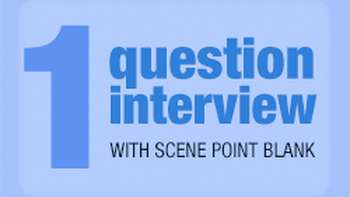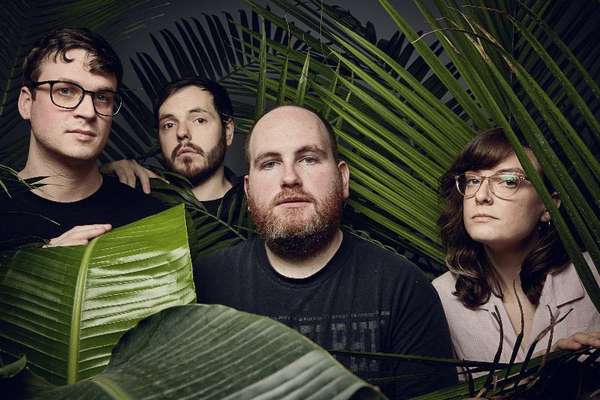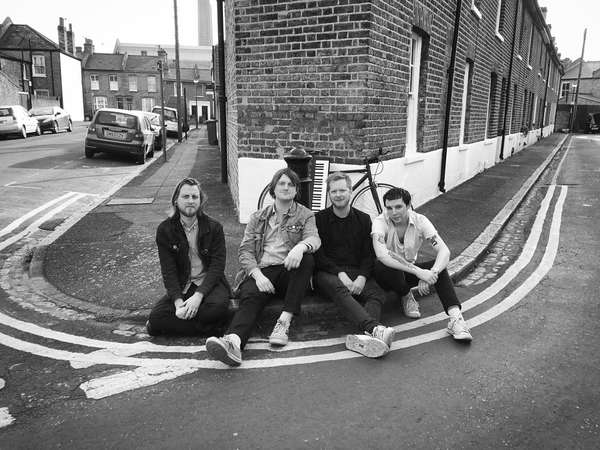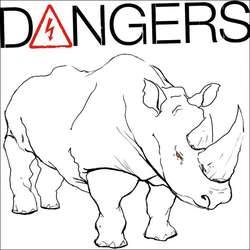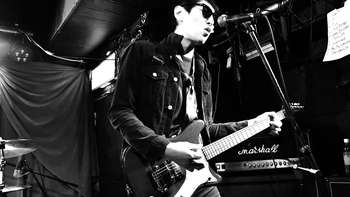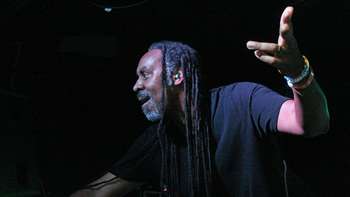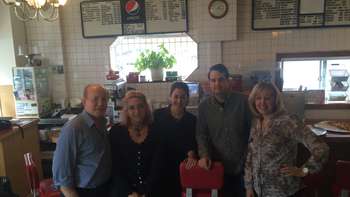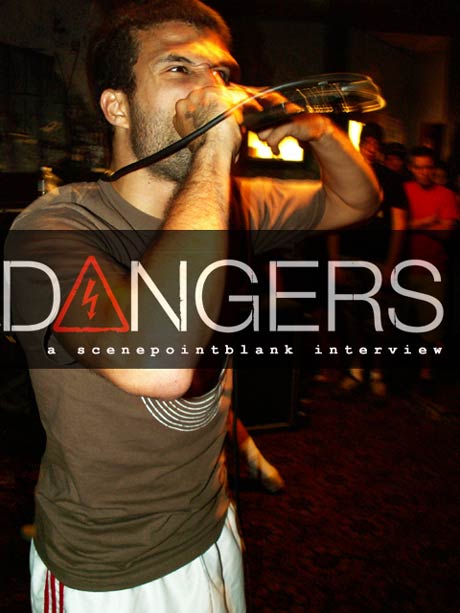
Think punk is dead? Well you couldn't be more wrong and Dangers vocalist Al Brown is going to tell you why. Scene Point Blank caught up with Brown to dicuss the origins of the band, their recent release Anger, the band's provocative lyrical content, and the importance of diversity in the punk music world.
Scene Point Blank: Why did you choose the band name Dangers?
Al: Coming up with a band name is always a difficult thing because you are usually just starting out, just starting to play together, and you haven't yet fully come together to the point where you can name the band appropriately. I guess it's sort of like you end up naming the band after what you hope it will become. A sort of projection for what you hope the band will be about. I guess it's similar to how kids are named. Like, why do parents named their daughter Lucy instead of Abigail? No sooner do they get the afterbirth gunk off them and, bam!, they have a name. You don't know anything about them. You should wait awhile, I think. Probably a good idea with bands, too, if you ask me, to wait. Anyway, we didn't take the waiting approach with Dangers. Tim and I were in line to go see a movie and we had already spent a good week or two thinking of names because the demo had already been recorded and we were eager to get it out to people and needed a name before we could do that. So, there we were, sitting in line to go see some movie, and we were saying name after name. I don't remember a lot of Tim's suggestions. I know I had some gems, though. Boombox. The Thriller. You know, some real horrific things. And then I guess we just stopped all the silliness and tried to figure out what we really wanted the band to be about. The idea is pretty simple, actually. In our eyes, punk rock music has the potential to be very dangerous. It's not so much that the music is loud and abrasive to the ear or anything. There are plenty of genres of music and bands that are loud and abrasive and yet they have no aspect of danger about them at all. The real danger lies in punk music being one of the only forums of popular culture that attempts responsible and progressive thought, action, and discourse. The problem, for the most part, is that punk rock has veered away from trying to say something or mean something. For the most part, punk music seems to refer to a sound rather than a mentality. The goal, as signified by the name of our band, is to put some of the dangers back into punk music, back into music in general. To make it about substance rather than sound. Where what's being said makes people think a little bit again.
Scene Point Blank: Why is your new album named Anger? Why did you choose a rhinoceros to be the image on the cover of Anger?
Al: The name of the record seemed pretty obvious once the lyrics started taking shape. I wrote about half the record before narrowing in on the idea of anger as a theme. I liked that the word "anger" was contained in the name of the band. That emotion is definitely apt for the things we write about, for how we feel about the world. The songs aren't all angry songs, aren't all about being angry, but they all definitely emanate from being angry and fed-up with a lot of what's going on in both the world and our private lives. I think the emotion of anger is one to cultivate. Anger is at the root of a lot of change. At one end you have complacence. Acceptance. Letting the world pass by. At a the other end there's anger. Frustration. Being so irked by the world that you need an outlet for how you feel. That's what the record was. A productive outlet for feelings of anger. As for the rhino, that came about after a few weeks of trying to figure out an effective cover. We had a friend of ours, Dan Heidner, sign on to do whatever art we asked of him, but we couldn't come up with anything for a long time. I guess the idea was to do something simple and effective that, somehow, was evocative of the emotion of anger. A bull seemed too simple. And a rhino seems more angry. More on edge. Like, there are a lot of people that get in bullfighting rings with bulls. Drugged up bulls, I know, but still. However, you never see anyone fuck with a rhino. That's the kind of anger you get out of the way for.
Scene Point Blank: What is your favorite song from Anger? Is there anything you weren't able to put on Anger that you feel will be more of a focus on the next album, lyrically or musically?
Al: I think the song I'm most proud of on the record is "Half Brother, All Cop". I feel as though, musically, it achieved the blend of sound that we were looking to get at. It starts oddly, and then veers into a sound that's straight ahead and commonplace in the punk genre. And then it veers off again into a territory that I feel is new and fertile. The quieter part mixed with the eastern chord progression. And I think Adam did a crazy job coming up with some interesting fills. I don't know, I like that song a lot. Lyrically, I think it achieves something that I aim for almost all the time. I try to write lyrics that are extremely personal but that still manage to communicate a more universal message. I think I was able to accurately describe my personal disgust for my half brother while making it apparent that it's his profession that has had a large part in turning him into an asshole. Anyway, it's hard to answer this question because I like the way the songs go with and against one another on the record. So without "My Wonder Years Never Got Cancelled" being right next to "Half Brother, All Cop" I don't think I'd like either one as much. I don't know if that makes sense. I think they compliment one another nicely. Something like that. And as for what we are going to do next time, who knows? Listening back to the record now is strange because it was a very concentrated month of recording and I got lost in a lot of it. Musically, I know we'll be taking more time to fine-tune everything next time. Lyrically, I'll do better to slice more at the things that get to me. It's always just a struggle to try to refine your ability to communicate. To say more accurately what you mean.
Scene Point Blank: In "Power Chord Blues" there is a complaint of cliche music and messages. What do you feel about Dangers, in both fields, separates it from the type of bands complained about?
Al: I think it's important to make a distinction between "cliché" and "complacent" music. Clichés are an important part of any work of art. Working with and against them usually gives people a foothold or an entrance point. What I mean is that I think that some of the most effective art uses styles or ideas that have become cliché and modifies them so that a new meaning is created. The literary works of Robert Coover come to mind. The photography of Cindy Sherman. The way Led Zeppelin used the blues. Refused modeling their efforts on The Shape of Punk to Come on the jazz efforts of Ornette Coleman. So, what I mean is that the argument in "Power Chord Blues" isn't against clichés. I think, as a band, we conform to a whole lot of clichés, both musically and message-wise. Lots of bands have songs about growing up, cops, war and killing being bad. Lots of bands use the time signatures we use, the keys we play in, the rhythms. I don't think we were necessarily trying to play music without any clichés. However, we were doing our best to use the clichés and modify them. Make them new again. A lot of it has to do with mixing and matching, meshing different sounds together that haven't been used together yet in punk. Like the intro to "Half Brother, All Cop" and what follows right after. Or how we can throw a song on with just a beat stolen from Nirvana and me singing. Anyway, I like to think that we used clichés to work against complacency. We made a lot of active decisions when we recorded. We didn't throw something on the record because it was easy or what sounded good. Lyrically, we aimed to take new angles on things, to talk about the war from my personal understanding. I think we did a fairly good job at putting together something that is familiar enough to get kids to listen, while at the same time it reaches to a few places that are new and, for me, more meaningful than a lot of other bands out today.
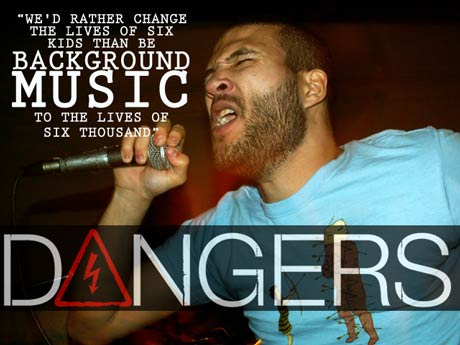
Scene Point Blank: Why do you put on Sink With Cali Fest? How did it go this year? Your favorite ever Sink With Cali moment?
Al: We put on Sink With California Festival because we think it's important to give bands and kids a forum to communicate. There aren't enough people listening to bands like Burial Year, Broken Needle, Sunset Riders, The Flex, Acts of Sedition, or Greg Macpherson. I guess the hope is to lure kids to the beach and to have them leave with new friends and new ideas in there heads. New ideas of what punk is, what punk can be, how it can be used. Also, I like to see kids have fun. I like fun. The beach is fun. And this year's festival went well. There's been a lot made of the "rivalry" between Sound and Fury Festival and our own. To be honest, that festival took a lot of wind out of our sails and it forced me to find a whole new slew of bands that I hadn't anticipated. In the end, I was really proud of the bands we brought in. I was really proud of the locations we got. I know that all the kids that came had a great time because I saw the smiles on their faces. We lost money so, financially speaking, the festival was a pretty big failure. But I've come to judge success in terms outside of the money we make or don't. I only hope more kids come out next year so that the bands get the ears they deserve. And as for my favorite moment: Zed's penis. Also: Modern Life is War the first year.
Scene Point Blank: What ideal do you feel is most important to fight for?
Al: Is this a trick question? I don't like fighting. You shouldn't fight for anything. Do or do not. There is no try. And, to answer your question, I think it's important to have less assholes on the earth. People should read more and procreate less. I think the most important thing a person can do is constantly aim for betterment. The second you become content with yourself, you think less and read less and become more of an asshole. To fight for something like "peace" or "justice" or against something like "terror" seems like misplaced effort to me. Better yourself, help those around you as much as you possibly can, and make sure you end up giving back more than you take from the world. If everyone was that way, we might all have nicer lives. That'd be nice.
Scene Point Blank: Why did you re-record "We Have More Sense Than Lies" and "We Broke The P.A." for Anger and nothing else? Was there any thought in having these be the first and last songs of the album?
Al: These songs weren't re-recorded on the 7" we did for Old Guard Records and we thought it was important for them to be made more widely available. I think they make good bookends for the rest of the songs on the record, as well. I guess the former is about circumventing the popular avenues of marketing music, like Clear Channel and Ticketmaster. The latter is about doing more, about changing the way we do things. So they are both about change in a way.
Scene Point Blank: How did the writing process for Anger go about?
Al: Dangers writing processâ?¦ Hehe, who knows? It's a crap shoot, really. Some of the songs were written by me on an acoustic out in New York. I'd record them on GarageBand and send them to Rollie and he'd go, "Hahahaha!" Some of the songs were written in the studio in about five minutes. Generally speaking, I'll usually come to the rest of the guys with a music idea or a lyric idea and we sit in a room for a few hours and make it work for all of us. We all listen to very different kinds of music, and I think we each take the song we are working on and add our own sense of what's "good music" to it and, somehow, they end up like they do. Tim will usually scrap a lot of ideas because he's a grump. Rollie laughs at a lot of things I suggest. Adam always wants to add tambourine. For Anger, we had song outlines that I had made back at school in New York. When I got back in May, we all went to the practice room for about three or four marathon sessions and changed everything all around. That's how the music was done. Lyrically, I wrote everything and then sent it to all of the guys to get their input and they changed things around and helped make things fit better and mean more.
Scene Point Blank: How did Rollie's involvement as guitar player and sound engineer effect Anger?
Al: Rollie is the best musician I've ever had the pleasure of playing music with. He's also the best engineer I've ever had the pleasure of working with. He knows his shit. Basically, working with Rollie is frustrating because he's a perfectionist and won't stop until things are just right. I'm like that, too, as is Tim, so it gets a little frustrating when things are a little off. What's good, though, is that he slims down the music so that it is better. He adds a bass line or a different way to mic something that makes a song more what it was supposed to be. Rollie's recorded every Dangers song ever and he will record every Dangers song yet to be recorded. It's pretty awesome that we get to do that and keep complete control over all our music. We write it, we record it, we put it out. Rollie's awesome.
Scene Point Blank: In "War? What War?", what did you mean when you wrote, "Presidents don't pull triggers, so don't blame Capitol Hill"?
Al: I think that's pretty self-explanatory. I think it's easy to blame the president and our current administration for the evils of "The War on Terror." I don't mean the line to remove all culpability from our government, but I do think it's important to remember who is doing the killing in this "war." Orders are given by the president and generals and politicians, but those orders are carried out by boys and girls just like you and me. I like to imagine a world where a soldier questions his government as much as I do, where he won't pull a trigger if he knows in his heart that it's wrong to do so. I can't see any possible logic that affirms our involvement in killing Iraqis or Afghanis or anyone, really. There are atrocities happening the world round, daily in Africa, Asia, Mexico, Venezuela. Our government does not send us to fight or "liberate" in these places and, to me, it seems obvious that we aren't there because there is no economic gain from doing so. The corollary to this says we are fighting in Iraq because we have economic gains in mind. I think that much is obvious to anyone - soldier or not - who takes a moderate interest in current events. I think soldiers - the people that go and actually fight and kill and pull triggers - have the responsibility to seek out the facts about why they are killing. If they disagree with these facts - and I don't see how they could not - I think it is also their responsibility to renege on their contracts and orders. I guess it comes down to this: I respect my father and listen to what he has to say and do much of what he asks of me. But if he says to point a gun at a woman on the street, or if he says to jump off a building, or if he says to eat glass, well, then I tell him to fuck himself and I deal with the consequences. If there were no soldiers in our army, there would be no killing. That's my (admittedly naive) opinion on matters.
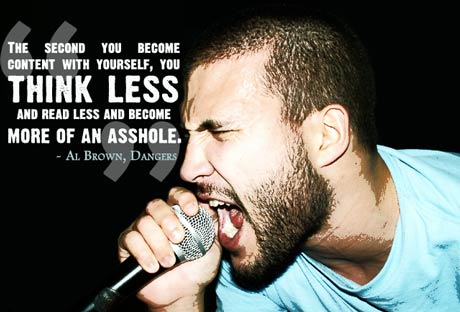
Scene Point Blank: How did your tour with Greg Macpherson go? Was there any awkwardness from sharing a show with such a quieter act? Are there any plans for future tours/shows for Dangers?
Al: Greg Macpherson made me cry at Sink With Cali this year. He played "California" and the whole scope of my year sort of hovered around me and just watching him did a lot to make things more okay in my life. What struck me was that the man flew by himself to California to play two shows with a band he'd never heard simply because he agreed with the ideals of the festival, with the do-it-yourself approach our band takes to touring and putting on shows. The man is about ten years older than me and has proven to me that punk rock is definitely not about a sound. It's about an approach to life. A common-sense way of looking at things where you forgo middle men and green M&M's and tour busses and you get down to plugging in your shitty Strat and playing music that means everything to you. The two shows we played with Greg were two of the most important of my life. I hope we get to play many more with him. Maybe a tour up in Canada. As far as other plans, we will tour in the winter. We will tour in the spring. We will play houses, we hope. Garages. That sort of thing.
Scene Point Blank: Are you still feeling effects from playing the song "Neo-Neo Nazis"? Does the fact that some people associate you only with this song make you want to stop playing it?
Al: I don't know if we are or if we aren't. I don't really care if we are or if we aren't. Other people will never affect my desire to play or not play a song. We wrote a song that we believed in, that we still believe in. If there are human beings that are narrow enough and arrogant enough to think it's solely about them, that's not on my conscious. Fighting at any punk rock show for any reason is bullshit in my book. I have personally seen members of FSU fight at shows. I have seen them smash chairs on people. If that's what I've seen, and if I think they are a big enough problem to write a song about, I will. I did. I think people who play music should always right songs about the things they know, about the things that irk them, that drive them. That's all we did. I don't think that's wrong. End of story. Anyway, our band is about much more than FSU or fighting. Some people get that. That's nice.
Scene Point Blank: You have a song about the Tiki House; what is this place and why did you write a song about it?
Al: The Tiki House. Wow. Imagine a logging town with row after row of form houses. And, inside one, there are thirty teenagers going ape shit. They all sleep there. There are no parents. They have Misfits tattoos. They have a bearded dragon named after the Lizard King himself. They are all in bands. They cover SSD and Minor Threat. They spray paint their garage. They invite our band to come play. We do. I say the words of our songs before we play them. They sing along. They jump all over me. All over the band. It's like this: there's Greg Macpherson at one end of the spectrum, and these Bremerton, Washington kids on the other. I'm in the middle loving life. That's how it is. Sunset Riders, HIV, The Flex, The Valley of the Dinosaurs, Count the Hours, Whip the Kitty. That's The Tiki House. I'm going to do a comp with all those bands on it, so look out for it. It will be the best thing you hear this year.
Scene Point Blank: Why doesn't Dangers have a Myspace?
Al: Apparently we do. Someone made one for us. I fucking hate Myspace. I guess it goes along with what I was saying before with complacence. Myspace makes everything one click and far too easy and boring. We don't want a Myspace because we don't think it's appropriate. We don't want to be some unknown band, but we do want to have a true affect on those that chose to listen to us. We'd rather change the lives of six kids than be background music to the lives of six thousand. That means much more to us. Myspace goes against these aims because it's too simple. It removes the need for effort on the part of the listener. Bands will have the first song on Myspace with a zillion listens. The next three have none. We don't want that. Etceteras. Etceteras. Etceteras.
Scene Point Blank: What are your thoughts when you look back on The Miracle Mile?
Al: It was a good intermediate step to get to Dangers. I like the last EP a lot. I think it was good. We had a lot of fun, sometimes.
Scene Point Blank: In addition to writing lyrics, you also write in a way that is only meant to be read. Do you have any plans to release any of this?
Al: I will be the author of many books. I'm writing one right now. It's about violence. And knives. And iron lungs. Hopefully you'll be able to pick it up in a year or two. That's how these things go. There are a lot of steps between now and then. I'll go about those silently, on my own, and I'll let you know when the bookstore finally has a copy. Deal?
Scene Point Blank: If you could share one thing you've learned from Dangers, what would it be?
Al: If you plan on touring the western coast of the United States, take Interstate 101. Don't take the 5. Also, the bridge at Whiskeytown Lake in Redding, CA is jumpable, should you have the guts to do it. Also, Honkin' Huge Burritos in Portland, OR is a no-brainer, obvious stop. Powell's Books could be organized a bit better. Also, getting punched in the face hurts.
Scene Point Blank: What have you been listening/reading lately?
Al: Neko Case, a lot. Fox Confessor Brings the Flood and Blacklisted are great records. I can't stop reading Barthelme and I wish he were still alive. Cometbus all the time. He's actually putting a story in the Columbia Journal, which I'm an editor at. I read Wes Eisold's two zines and thought they were great. He's got a new press he calls The Heartworm that's great. Also, read Etgar Keret. The Bus Driver That Wanted to Be God and Nimrod Flip Out are unique and worthwhile. I read The Believer. Rollie swears by the author Michel Houellebecq as he should. Bukowski. The Mezzanine by Nicholson Baker. I listen to Acts of Sedition, Hot Snakes, Victims, and A New Enemy. "El Condor Pasa" by Simon & Garfunkel is probably my favorite song right now. That's enough, I think.
Scene Point Blank: Any last thoughts?
Al: This is a horrible last question. It's always "Any last thoughts?" for the end of an interview. Lame. Anyway, you can get our new record on our website or you can go to RevHQ and get it there. Please buy it. We put it out ourselves. We think more bands should put records out themselves. Bar codes are for losers. Ten dollars is not too much for a show. Or shirt. Or record. Less TV. More books. That sort of thing.
Interview: Zed
Graphics: Matt
